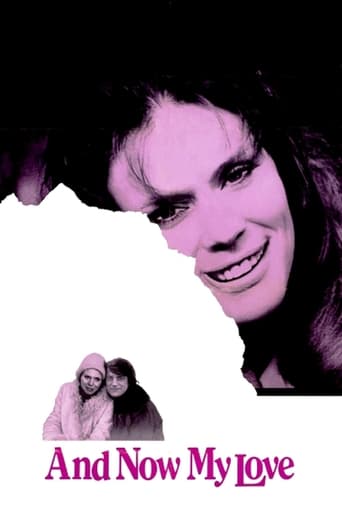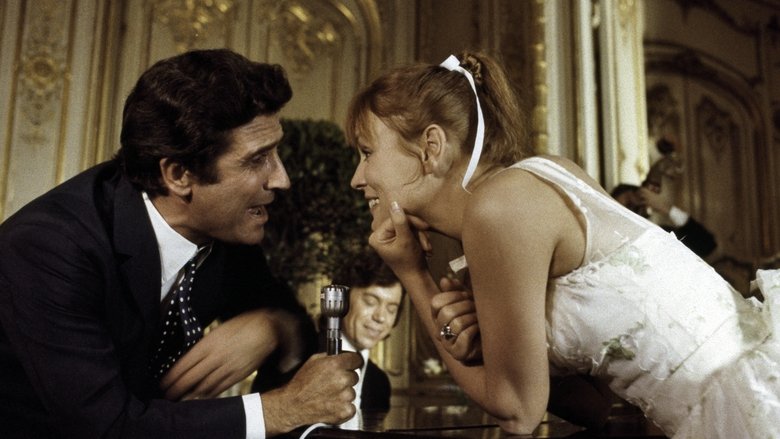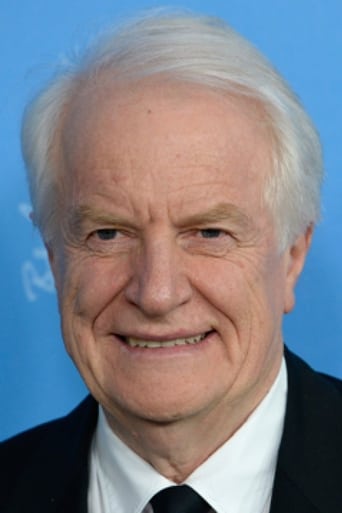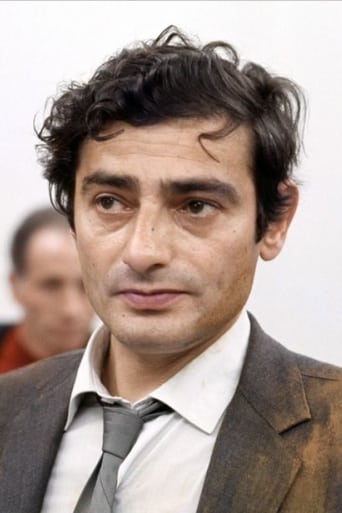

And Now My Love (1974)
The movie follows the lives of a woman and a man starting from several generations earlier. The story spans a whole century and several continents.
Watch Trailer
Cast


Reviews
It’s sentimental, ridiculously long and only occasionally funny
The movie's neither hopeful in contrived ways, nor hopeless in different contrived ways. Somehow it manages to be wonderful
The film's masterful storytelling did its job. The message was clear. No need to overdo.
The film never slows down or bores, plunging from one harrowing sequence to the next.
"And Now my Love" directed by Claude Lelouch is a philosophical and socio political film which follows 3 generations leading to two adults who will someday meet each other when they become mature enough to deal with love. The director sends many social and political messages throughout this love story and one must pay close attention to gather all information. The film begins at the turn of the century. The director uses camera techniques to illustrate each period. It changes to conform to the movie-making industry. During the early 1900s, the film is a black and white silent film. First, we are shown a photographer and woman falling in love. Second, a lady giving birth. Third, a letter arriving during combat. The letter is by the cameraman and when he shouts, "it's a boy!" a bomb falls on him. A very nice montage of a human's life: Fall in love, produce children, and then we die. Repeat cycle. Then the story begins with a dancer who is having an affair with an officer. She marries his superior. It is unclear whom the child belongs to. The husband soon discovers who the girl's father really is and kills the dancer. Suddenly we are thrown into a new period. We move into an era of color and sound. A train appears of men and woman returning from the concentration camps. A man locks eyes with a woman. No words are spoken but we know they are about to fall in love. From this scene we know all the characters shown are Jewish and related to one another. Finally, we are introduced to the new generation. Sarah who was born with a silver spoon in her mouth as her father (the man on the train) has become very successful with his shoe making business.There is a parallel storyline of a young woman who was born with everything and a young man who had nothing. On Sarah's 16th birthday, it is clear her father spoils her rotten. A famous French singer Gilbert Becaud sings at her birthday party. He seduces her, takes her virginity, she falls in love, he leaves her, and she is left with a broken heart and tries to commit suicide. She survives and her father takes her on a trip to many exotic cities while teaching her about life experiences and the world. The filmmaker expresses monotonous philosophy. The filmmaker's personal views on religion, culture, history, etc. Sarah is a spoiled, ungrateful, and care free young woman so she sees no value in what her father says. She doesn't really appreciate it until after her father is gone. She didn't fight for what she has like her ancestors and when she inherits it all she has no idea what to do. Sarah has many love affairs but she is not content. She wants to have a child but doesn't really get along with men. She gets bored easily and moves on to the next thing that sparks her interest without a care. She starts out immature and turns into a social conscious writer often gaining insight from her father's words and her experiences. On the other end, there is Simon who is the complete opposite of Sarah. Apparently he is just her type. We are given clues to this. For instance, Sarah mentions in a restaurant with her father, she wants "a man who is part rascal and part gentlemen." This describes Simon well. During the parallel stories we see him steal Becaud records after we are shown Sarah's party. He is a juvenile delinquent. We know Simon is mischievous but he is also a romantic. He struggles to survive but seeks a girl who sweetens her coffee with three teaspoons of sugar (as his jail mate said he must). When he is interested in a girl, he always asks her. We see Simon get his heart broken. He goes from thief to porn filmmaker to successful commercial director. Throughout the film, there are updates on the time period with historical figures, events or cultural icons (WWI, Hitler, Marilyn Monroe, Berlin Wall, Nixon administration). Our two protagonists cross paths many times but do not meet until the end when on a plane and Sarah asks for three teaspoons of sugar. This is definitely a romantic film about destiny but at its core it is a political film addressing how society is rapidly changed throughout the century. The filmmaker was obviously influenced by both French and American culture and uses his own philosophy of life to move the film along. The film draws attention to politics such as wars, emptiness of western world, unionizing of workers, class, a bored generation who has everything, and degradation of society. However, in the end, the new generation is still shown to be capable as our two protagonists find each other.
I first saw this film in 1979 at a revival house and it turned me from a film lover to a film fanatic. If someone said to me at that time that I could make a feature film on any subject I wanted, I've no doubt that I too would have tried to cram the story of the 20th century into two hours. I too would have gone zaza with the camera, making it as obtrusive as hell but to the effect of bringing the audience to giddying heights of emotion. I too, would have made it a great love story as seen from the perspective of fate built up from generations. I doubt I could achieve what Lelouch achieved though, because he is a supreme story-teller. Just look at what he does in one scene where the parents of our heroine meet for the first time on a train. There is no spoken dialogue, but they communicate in resonant volumes just with their eyes.Twenty-three years later, some cracks have worn through for me. I cringe every so often at the self-indulgence of the two romantic leads, particularly of our heroine, played exquisitely by Marthe Keller. There's a wonderful almost throwaway line when this super-affluent woman's father tells her she should try strolling through a hospital for just five minutes every day. It's sound advice, especially for someone so sorely lacking in the perspective of human angst. Also, sometimes it seems that the film's political ambitions are stretching through the seams since, with so little time to tell the story, people and positions get overblown. But overall I forgive the film these indulgences since it is the love story that keeps us grounded. Every so often our two lovers cross paths yet do not know what destiny is awaiting them. I can't imagine a single soul watching this not bursting a little with glee as the invisible hands of fate set up the moment when these two lovers inevitably do find one another. SPOILER ALERT!Alas, in the DVD version, that moment of magic has been spoiled. Just as Cupid's arrow softly strikes their unsuspecting consciousness, we are suddenly catapulted into another movie. I can only describe this movie as something like Zardoz-meets-The Pepsi Generation-meets-Masters and Johnson. Really, no words can describe it. Apparently, thirty years ago Claude Lelouch shot a sixteen-minute science-fiction segment (obviously under the influence of saccharin-laced LSD) to be edited into the last scene in the film. Either brighter minds prevailed or a moment of sanity took hold for Lelouch because that scene never made it to the final film. It should have been burned, but I guess it was tossed into some vault. It has now been unleashed and re-edited into the film, spoiling the subtly divine ending, and driving its audience to raid their medicine cabinets for massive doses of Tylenol. The scene simply has no business being there. It's dumb, painfully [!] dated visually, and even more ridiculous now than it was thirty years ago since its story assumes that by the new century (that's us), most humans will be giving birth to monsters. Jerry Springer and American Idol aside, Lelouch can't literally warrant a `See? Told you so!', and from the way it's illustrated in this film, such a the theory won't even hold water in the next millennium unless Edith Head's family line merges with that of Star Trek's art department. All I can say is see this movie with someone you love and near the end of the film when the lovers sit down in the plane and mention `three sugars', turn the movie off!
I saw this movie in Lima, Peru back in the mid-seventies. I was impressed by Leluch treatment of the story´s three generational levels and the very original ending (the zooming camera on the luggage). That scene at the last few seconds of the film was the best ending I´ve ever seen for a romantic story, spreading through three generations. I would like to see it again, either on VHS or DVD but I think there is no version available. It´s a pitty.
This is a complex, gimmicky, manipulative and insanely romantic film, and it's my all-time favorite movie, bar none. And I prefer the U.S. version, which was truncated somewhat from Lelouche's original, because it punctuates the essence of the film -- that we are all somehow destined to our fate, even going several generations back, but we must cooperate by following our hearts and souls. I've seen this movie more than 20 times and it still fascinates me.




